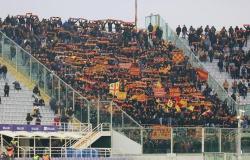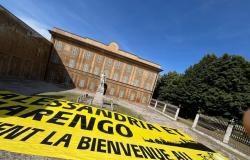03 June 2024, 9.51pm
4 min read
Pollara. Aeolian Islands. 4 June 2024. “I’m still here | I’m still here | it’s such a trivial thing which in the meantime goes on.” Few discussions. Massimo Troisi his last human, intellectual and artistic home was in Sicily. The Aeolian Islands. Saline. Pollara beach. The last things seen and the remaining time available are in these places. They are the colors of lava stone and the lightness of pumice stone. A long sunset over the Tyrrhenian Sea, a long farewell and an immense sea.
He is still here and I write as if I were there. Thirty very short years since that 4th of June 1994 when he died. Massimo Troisi was lazy in the affairs of the body but he was lightning quick in grasping the weak and miserable point of every aspect of personal and collective life.
One. Try asking Artificial Intelligence to give shape to Minollo (with images or words) and it wouldn’t know where to start. Inventive Intelligence is not the bread and butter of algorithms and, like Noah, Minollo would not find an algorithm in the list of existing animals. The algorithms are too idiotic.
Two. “There are those who say that to tell good stories you just need to look around. I do not believe. If that were the case, the traffic police would all be Ingmar Bergman.”
In order not to refute or discuss this statement, Italian writers, directors and creatives have chosen to be hired by a hyper Global Municipal Police Force, telling what they see even when they don’t see it. Sorrentino, for example, saw a woman in Partenope.
Three. “We always blame hunger for all crimes and cowardice. It would be true if those who weren’t hungry behaved well, but that doesn’t seem to be the case.”
Translated into elementary terms and knowing what has happened in these three decades without him, we can say that for a person hunger is an ugly beast but satiety is often criminal: it is like a pack of beasts in the body of a single person without more desires and cravings for something new.
Four. “In Naples, unemployment is a problem and politicians want to solve it with investments. Then they saw that a Carabinieri van can run over a few unemployed people. And there are many of them. If we want a serious investment policy, we need bigger trucks”
For a year now it seems that repression in the squares of dissent has appeared out of nowhere in Italy. Is Fascism upon us?
If it is, it knocks on the bathroom doors, because in the dining room, in the living room and in the kitchen, if we want to define Fascism as the way in which the State administers the squares, it has already shown in the past what it is and how it manifests itself, according to degrees and hardness without comparison with today
Five. “The wealth of the poor is their children while that of the rich is their parents”
In the institutions and in the main places of economic and cultural power, the principle of the family exists, natural or otherwise, it matters very little. Merit is a synonym of family tree and abilities are a vocation. A copious list of dynasties could be made.
Six. “Success is an amplifier. If someone was an imbecile before, he becomes very imbecile. If he was human he becomes very human”
Approval, especially when it is high, whatever form it takes, is not in itself a measure of quality and talent.
Mussolini, towards his end, confided to a journalist: “in the dialogues that I have had many times with the multitudes, I was convinced that the shouts that followed my questions were a sign of conscience, of understanding, of evolution, of assent, of satisfaction, instead it was collective hysteria.” Poor Duce, like Saviano, Fazio, Scurati and many others, had confused the strength of propaganda with his own talent. It shouldn’t happen, but it does
Seven. “When I think about Pasolini, how he acted in relation to society, to things, I respect myself very little”
Thinking back to these words of Troisi it almost seems that it was not destiny but Pasolini himself who suggested to the Gods to call him back to other roles while he was in Ostia Lido, as it was for him. A way of stating that Troisi was more than worthy of thinking of Pasolini, considering himself in some way an equal to him. Troisi was wrong. Who better than Pasolini could evaluate the Neapolitan greatness of Troisi, who from the bottom of his laziness grasped and designed ‘the glories and miseries that represent us as persons and as a people?
Parthenoperia, if we want to define it that way, exists, and it is that cultural, identity characteristic in which the heart reasons and the mind is moved. Because fantasy has precisely this characteristic, which in some way Giovan Battista Vico announces and fixes forever. “Fantasy is nothing other than a memory expanded over time and a recomposition of past, present and future facts in the shape of a dream.”
It was nice to live in a time in which Massimo Troisi lived, who died a natural life and was rich in the values that people who did not spare themselves have. Point.
Published on
03 June 2024, 9.51pm





